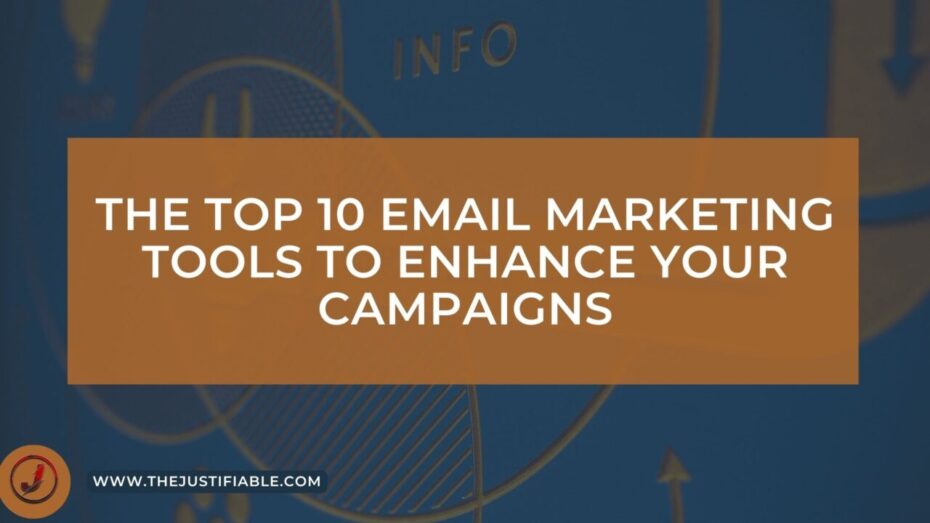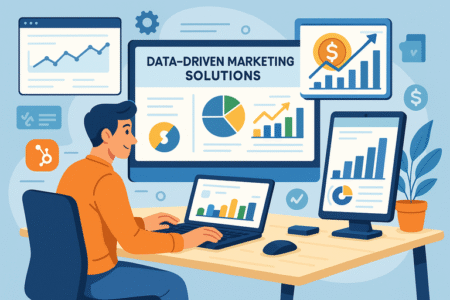Table of Contents
The top 10 email marketing tools to enhance your campaigns!
In today’s digital era, email marketing is one of the most effective ways to reach out to customers and promote products and services. However, to make the most out of your email marketing campaigns, you need the right tools.
Email marketing tools can help you automate your campaigns, create professional-looking emails, and track your results, among other benefits. In this article, we’ll be discussing the top 10 email marketing tools that you should consider using to enhance your campaigns.
1. Mailchimp
Mailchimp is a popular all-in-one marketing platform that provides businesses with a wide range of tools to create and manage email campaigns, social media ads, landing pages, and more. With over 20 million users worldwide, Mailchimp is a trusted name in the world of email marketing.
Features – One of the key features of Mailchimp is its user-friendly interface, which allows users to create professional-looking emails without any coding skills. The platform offers a variety of customizable templates and designs to help businesses create campaigns that stand out.
Mailchimp also offers social media marketing tools, including the ability to create and run Facebook and Instagram ads. Additionally, Mailchimp integrates with other marketing tools such as Google Analytics and Salesforce, making it easy to track campaign performance and measure ROI.
Reporting and Analytics – Mailchimp’s reporting and analytics features provide users with real-time data on campaign performance. From open rates to click-through rates, Mailchimp offers users the data they need to make informed decisions about their marketing strategies.
2. Constant Contact
Constant Contact is a top-rated email marketing platform that helps businesses of all sizes to create and send professional-looking email campaigns. With its easy-to-use interface and powerful features, Constant Contact has become a popular choice for small business owners and marketing professionals alike.
User-Friendly Interface – Constant Contact has a user-friendly interface that makes it easy for users to create and customize email templates. The platform offers a drag-and-drop editor that allows users to easily add images, text, and other elements to their emails.
Email Automation – Constant Contact also offers automation features that enable users to send targeted emails to specific groups of subscribers based on their behavior or interests. This feature helps to ensure that each subscriber receives the most relevant content, improving engagement and conversion rates.
List Management – Constant Contact also offers powerful list management tools that allow users to segment their subscribers based on various criteria. This feature helps users to target their campaigns to specific groups of subscribers and increase the effectiveness of their email marketing efforts.
3. AWeber
If you are looking for an email marketing solution for your business, AWeber is a platform that should definitely be on your radar. AWeber is a powerful and easy-to-use email marketing tool that allows you to create and send professional emails, automate your email campaigns, and track your results with ease.
AWeber offers a range of features that make it stand out from other email marketing platforms. Here are some of the reasons why you should choose AWeber:
- Easy to use: AWeber is known for its user-friendly interface, making it easy for beginners to get started with email marketing.
- Robust automation: With AWeber, you can easily set up automated email campaigns, saving you time and increasing your engagement rates.
- Customizable templates: AWeber offers a variety of customizable email templates, allowing you to create professional-looking emails that reflect your brand.
- Analytics and reporting: AWeber provides detailed analytics and reporting, allowing you to track your email campaign’s success and make data-driven decisions.
- Great customer support: AWeber has a dedicated support team that is available 24/7 to help you with any issues you may encounter.
4. Campaign Monitor
Campaign Monitor is an email marketing tool that’s geared towards businesses of all sizes. It’s known for its customizable templates and powerful automation features.
With Campaign Monitor, you can create professional-looking emails using their drag-and-drop email builder, and automate your campaigns based on subscriber behavior.
The platform also offers advanced list management and segmentation features, so you can send targeted emails to specific groups of subscribers.
5. GetResponse
GetResponse is a popular email marketing platform that enables businesses and individuals to create and manage email campaigns, landing pages, and webinars
Key Features of GetResponse
- Email Marketing: GetResponse offers a range of email marketing tools including email design templates, email automation, and A/B testing.
- Landing Pages: GetResponse provides an easy-to-use landing page builder that allows you to create high-converting landing pages.
- Webinars: GetResponse’s webinar platform enables you to host live webinars, automate webinars, and create on-demand webinars.
- Marketing Automation: GetResponse’s marketing automation tools allow you to create complex workflows and automate your marketing campaigns.
- CRM: GetResponse’s CRM enables you to manage your contacts, track customer behavior, and analyze your sales funnel.
6. HubSpot
What is HubSpot? HubSpot is a cloud-based software that offers a suite of tools for businesses to improve their marketing, sales, and customer service. The platform includes features such as email marketing, social media management, CRM, lead generation, sales automation, customer feedback, and more.
Why use HubSpot? HubSpot provides an all-in-one solution for businesses to manage their customer interactions and operations. The platform’s intuitive user interface and extensive features make it easy for businesses to implement effective marketing, sales, and service strategies.
With HubSpot, businesses can automate repetitive tasks, track customer interactions, and personalize their messaging to attract and retain customers.
Benefits of HubSpot:
- All-in-one platform
- Intuitive user interface
- Extensive features
- Automated tasks
- Personalized messaging
7. ConvertKit
Are you a content creator looking for a reliable and efficient email marketing platform? Look no further than ConvertKit. Here’s why:
Easy-to-Use Interface – ConvertKit’s interface is user-friendly and easy to navigate, even for beginners. You can easily create and manage email lists, set up automation workflows, and create email templates without any technical expertise.
Powerful Automations – ConvertKit’s automation features allow you to automate your email campaigns based on subscriber actions, such as opening an email or clicking on a link. This saves you time and effort while increasing the effectiveness of your email marketing.
Segmentation – With ConvertKit, you can segment your email list based on subscriber interests, behavior, or any other criteria you choose. This enables you to deliver more targeted and relevant content to your subscribers, which leads to higher engagement rates.
Integrations – ConvertKit integrates with a wide range of third-party tools and platforms, including WordPress, Shopify, and PayPal. This allows you to seamlessly integrate your email marketing with your other business processes.
8. Drip
Drip marketing is a form of marketing that involves sending targeted, automated emails to prospects and customers over a period of time. It’s designed to nurture leads and customers, building a relationship with them over time, and providing them with valuable content and information that helps to move them towards a purchase or conversion.
Drip marketing offers many benefits to marketers, including increased customer engagement, improved lead nurturing, and higher conversion rates. It also saves time and resources, as once the initial setup is complete, the emails are sent automatically.
To make the most of drip marketing, it’s important to use targeted, personalized content that is relevant to your audience. You should also segment your audience based on their interests and behaviors, and use a tool that allows you to track and measure the effectiveness of your emails.
9. Sendinblue
This cloud-based platform offers a wide range of tools and features to help businesses create effective marketing campaigns and streamline their workflow.
With Sendinblue, you can create and send newsletters, automated emails, SMS messages, and transactional emails. You can also build and manage your contact lists, and track the performance of your campaigns with detailed analytics.
The platform also includes features such as A/B testing, segmentation, personalization, and automation. You can create custom landing pages and sign-up forms to capture leads and convert them into customers. Sendinblue’s intuitive drag-and-drop editor makes it easy to create professional-looking campaigns without any coding skills.
Integration with other platforms such as Shopify, WordPress, and Salesforce is also possible, making it easy to connect with your existing tools.
10. ActiveCampaign
ActiveCampaign is a comprehensive marketing automation platform that enables businesses to automate their marketing, sales, and customer support processes. With its intuitive interface and powerful features, ActiveCampaign has become one of the most popular marketing automation platforms in the market today.
One of the key benefits of ActiveCampaign is its ability to automate complex marketing processes. This includes everything from lead capture and segmentation to email marketing and sales automation. By automating these processes, businesses can save time and resources while also improving their overall efficiency.
Another benefit of ActiveCampaign is its ability to provide detailed analytics and insights. With its advanced reporting features, businesses can track the performance of their campaigns and make data-driven decisions to improve their overall ROI.
How to Honestly Compare Email Marketing Tools
With so many options available, it can be challenging to compare and choose the best email marketing tool for your business. Here is how to honestly compare email marketing tools and choose the one that’s best for your business.
Determine Your Business Needs
Before you begin comparing email marketing tools, it’s essential to determine your business needs. Consider the size of your email list, the type of emails you want to send, and the features you require to achieve your email marketing goals. For instance, if you’re a small business, you may not require advanced automation features or complex segmentation options.
Consider Your Email List Size
One of the most crucial factors to consider when choosing an email marketing tool is the size of your email list. Most email marketing tools charge based on the number of subscribers you have, so it’s essential to choose a tool that fits your budget and doesn’t charge you for features you don’t require.
Identify Your Email Marketing Goals
Identifying your email marketing goals is also essential in determining the features you require in an email marketing tool. Do you want to increase your email open rates or generate more leads?
Do you want to create sophisticated email campaigns with personalized content and dynamic segments? By determining your goals, you can narrow down your options and choose an email marketing tool that aligns with your business objectives.
Evaluate Email Creation Features
The email creation process is one of the most crucial aspects of email marketing. A well-designed email can increase open and click-through rates and drive conversions. When comparing email marketing tools, evaluate the email creation features offered by each tool.
Look for tools that offer a drag-and-drop editor, customizable templates, and the ability to add personalization elements.
Evaluate Email Creation Options
Different email marketing tools offer varying levels of customization and design options. Look for tools that offer a range of templates and customizable design elements. This will help you create unique and personalized emails that stand out from the competition.
Evaluate Personalization Options
Personalization is crucial in email marketing, as it can significantly improve your email open rates and engagement. Look for tools that offer personalization options, such as dynamic content and list segmentation. These features will help you create personalized emails that resonate with your subscribers.
Assess Automation Features
Automation is an essential aspect of email marketing, as it can save you time and help you deliver targeted emails to your subscribers. When comparing email marketing tools, evaluate the automation features offered by each tool. Look for tools that offer triggered campaigns, autoresponders, and advanced segmentation options.
Evaluate Triggered Campaign Options
Triggered campaigns are automated email campaigns that are triggered based on subscriber behavior, such as website visits, email opens, or clicks. Look for tools that offer triggered campaign options, as they can significantly improve your email engagement and conversion rates.
Evaluate Autoresponder Options
Autoresponders are automated emails that are sent to subscribers at set intervals. Look for tools that offer autoresponder options, as they can help you nurture leads and build relationships with your subscribers.
Consider Deliverability Rates
Deliverability is a crucial aspect of email marketing, as your emails must reach your subscribers’ inboxes to have an impact. When comparing email marketing tools, consider their deliverability rates.
Look for tools that offer features like spam testing, email authentication, and reputation monitoring to ensure your emails land in your subscribers’ inboxes.
Evaluate Spam Testing Features
Spam filters are constantly evolving, and your emails must comply with their regulations to avoid being marked as spam. Look for tools that offer spam testing features, which allow you to preview how your emails will appear in various email clients and identify any elements that may trigger spam filters.
Evaluate Email Authentication Features
Email authentication is the process of verifying the authenticity of your emails to prevent spoofing and phishing attacks. Look for email marketing tools that support authentication protocols like DKIM, SPF, and DMARC to increase the likelihood of your emails reaching your subscribers’ inboxes.
Evaluate Reputation Monitoring Features
Your email sending reputation plays a critical role in email deliverability. Look for email marketing tools that offer reputation monitoring features, which track your email sending reputation and alert you of any issues that may be affecting your deliverability rates.
Compare Pricing and Customer Support
Finally, when comparing email marketing tools, consider the pricing and customer support options offered by each tool. Look for tools that offer transparent pricing, flexible plans, and good value for money. Additionally, ensure that the tool offers reliable and responsive customer support to address any issues or questions you may have.
Compare Pricing Plans
Compare the pricing plans offered by different email marketing tools, and evaluate whether they fit your budget and offer good value for money. Look for tools that offer flexible plans that can scale as your business grows, and avoid tools that charge for features you don’t require.
Evaluate Customer Support Options
Email marketing tools can be complex, and it’s essential to have reliable customer support options to address any issues or questions you may have. Look for tools that offer multiple customer support options, such as live chat, email support, and phone support, and ensure that they offer responsive and helpful support.






